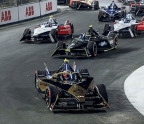Power play

Slowly but surely, hybrid systems are starting to creep into race series across the globe, with electric assistance no longer reserved for the rarefied heights of Formula 1 or LMP1. This is understandable, with even the most basic hatchback from most manufacturers now available with at least a 48V mild-hybrid system, it is to be expected that demand for their use in motorsport will grow.
If anything, it is surprising it has taken so long for them to arrive. Hybrid road cars have been widely available for two decades now, with the rate of uptake among the buying public increasing considerably in the past five years. As Matthias Dank, director of motorsport at McLaren Applied points out: ‘The need for people to adopt hybrid systems [in racing] has been there for a long time. The major reason being they are road relevant. We are stuck to IC engines for some time to come and manufacturers want to gain efficiency by hybridising their systems.’
There are multiple reasons for this delay. The most significant being most series’ regulations do not permit their use, which is closely related to another hurdle – cost. Series’ organisers have been cautious not to introduce extra expense to competitors that have long been feeling a financial squeeze (well before Covid-19 came along).
Racing, even at a junior level, is formidably expensive and hybridisation can only compound this. Combine these issues with the inexorable march of spec racecars, and the opportunity for a constructor or individual team to take a punt on hybridisation outside top-level racing has not been available.
However, times are changing, and hybrid powertrains are due to arrive in a number of series over the next couple of years. Looking ahead, IMSA’s LMDh rules and IndyCar’s upcoming regulations both specify a spec hybrid, with NASCAR due to follow suit at some point after its Gen 7 cars
You’re reading a preview, subscribe to read more.
Start your free 30 days





